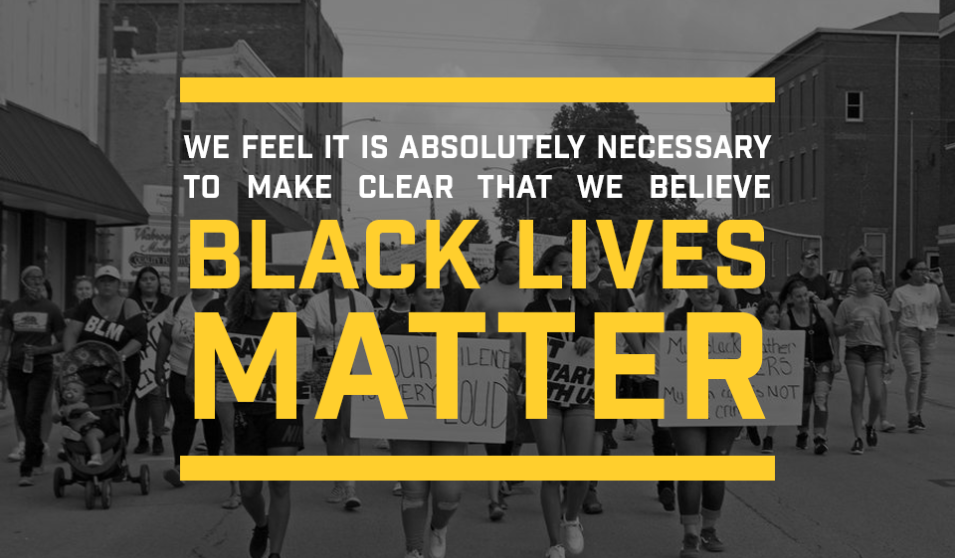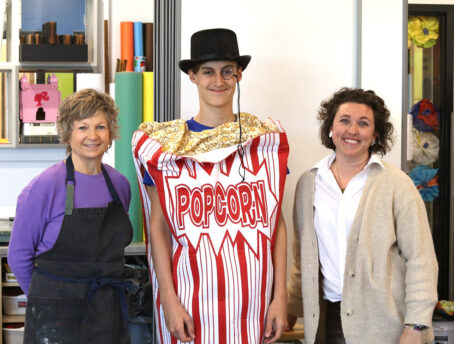In this article, you can find a letter from Gary Funk, Director of Rural Schools Collaborative, and a Statement of Solidarity from the RSC Staff below. Thank you for reading.
Dear Friends,
Many of our good partners have issued powerful and appropriate statements on the importance of Black Lives Matter and the need to take meaningful action. The Rural Schools Collaborative is proud to work with these organizations, and their promises of commitment, like those from the National Rural Education Association and the Community Foundation of the Ozarks’ Brian Fogle, provide me with a sense of hope and optimism.
However, a stronger and more inclusive rural future will depend largely on rebuilding social capital and tackling the challenges of “bright flight,” where so many talented young people leave small towns and do not return. We simply must develop a new generation of rural leaders, folks who are forward thinking, compassionate, and untethered by excuses or the status quo. They will need the courage to re-examine history and the gumption to act upon it.
It was with this in mind that I asked my young colleagues, Liliana Coelho, Julia Levine, Hailey Winkleman, and John Glasgow, to share their thoughts on Black Lives Matter and what they believe it means for rural school communities. These four twenty-somethings are smart, caring, and hard working. They took this task seriously, and you will be informed, if not challenged, by their thinking.
I want to thank the Rural Schools Collaborative board of directors for giving voice to Hailey, John, Liliana, and Julia. I also want to state for the record that I unequivocally support their Statement of Solidarity and its goals. I am proud to work with them.
It is time to change. Four hundred years of constitutional slavery, legal discrimination, defacto segregation, and institutionalized discrimination is enough. Furthermore, race has been used as a wedge issue to divide working people, which has paved the way for economies of extraction, rural outsourcing, and corporatization. These destructive forces have been very hard on rural places, and addressing them will require approaches that are just and sustainable.
Rural America needs an infusion of young, talented, and compassionate people. We should encourage them to lead the way.
Peace,
Gary Funk
Statement of Solidarity from RSC Staff:
We are in a moment of profound transformation. The murders of George Floyd, Breonna Taylor, and countless other Black Americans have catalyzed communities around the world to demand justice—including those in rural America.
Media outlets have focused on protests in urban centers, but in rural communities across the country, young people are taking charge and leading protests as well. Rural citizens have been energized to join hands and fight for the rights of their Black and Brown neighbors. In their demands to end the violence and murders inflicted by police, these protests in our small towns are revealing the strength of community which characterize our rural areas.
We commend the mobilization and resilience of protestors and therefore feel it is absolutely necessary to make clear that we believe BLACK LIVES MATTER.
We recognize that simply stating BLACK LIVES MATTER does not go far enough. That is why we are educating ourselves and listening to the demands of the BLM movement so we may better support their goals through our work. We are working to cultivate a vigilant awareness of how the culture of white supremacy shows up in our workplaces, communities, and schools. As an organization dedicated to the well-being of rural students and schools, we cannot constructively collaborate without doing this difficult, but necessary, internal work.
Above all, we must not and will not remain silent.
Among the demands of the Black Lives Matter movement is to “Defund the Police”. This would require substantially redefining how we address systemic issues in our communities, and redistributing money to support essential services like healthcare, mental health and drug rehabilitation programs, stable housing, community-based restorative solutions, and education. In a time when rural schools are seeing more budget cuts than ever, we whole-heartedly stand with these demands to have a more reasonable, well-rounded budget to support our rural communities.
We want to recognize that rural areas have been hit hardest by the realities of decreasing public investment, corporatization, and the loss of the middle class. For many communities, prisons have become an economic necessity. The demand from urban centers to “defund the police” may seem to have far-reaching consequences for communities where prisons represent economic stability. However, we believe that investing in rural futures does not have to mean investing in prisons.
In our organization, we strive to uplift investment in rural communities through public education. We would like to imagine a world where the thriving of rural communities does not depend on the further criminalization of Black and Brown people. During this time, we are turning our attention to scholars like John Major Eason, who suggest that large-scale economic restructuring programs such as the Green New Deal, could bring “carbon-free economic infrastructure” to rural areas, and could lead us to “a form of public investment that isn’t linked to mass incarceration”. By redirecting our focus towards all the incredible efforts that can be supported in rural communities, outside of prisons, we can begin to trace the path forward towards a sustainable future.
We want to ask our network: can we build a world where violence does not represent public safety? Can we create safe schools that no longer act as pipelines to prisons for Black students? Can we imagine economies in our rural communities that are not tied to mass incarceration?
We imagine a world where first responders are mental health professionals, medics, rehabilitation specialists, restorative justice mediators, and trained de-escalators. We imagine a world where the justified anger of Black people is met with actionable work towards transformation instead of violence. We imagine a world where schools encourage the dreams of Black students that lead us into this future.
Through our work with Rural Schools Collaborative, we remain committed to centering Black lives, stories, and accomplishments. To this end, we are having conversations internally to address how we can materially support Black educators, engage students of color, and further educate ourselves. We have chosen several concrete steps to act upon this statement of solidarity:
- We and our partners at the NREA believe we can better advocate for Black rural teachers by pivoting the "I Am A Rural Teacher" campaign into a more focused effort to collect stories from Black rural teachers. We will highlight folks through a “Black Rural Teachers Matter Project.” Additionally, we will engage teachers in the IAART Facebook group in these conversations, posting more resources and events, and inviting members to continue these discussions in their communities. If you would like to participate in the "Black Rural Teachers Matter", you can submit or nominate a teacher here.
- We welcome and encourage you to learn along with us about anti-racist teaching. To support this effort, we have created a resource document. We specifically encourage you to listen to and read the work of Bettina L. Love and listen to this round-table discussion on anti-racist teaching. We’d be happy to accept submissions for materials, please email info@ruralschoolscollaborative.org with your ideas and recommendations.
- We will continue to have conversations as an organization about how to integrate the demands of the BLM movement into our core focus—particularly, confronting white supremacy as it shows up in our schools and communities.
As a collaborative, we know that we are strongest when we work together. We believe we are in a time of great reckoning. We believe in listening to the future generations. We believe in taking action to ensure that BLACK LIVES MATTER.
Sincerely, the staff of Rural Schools Collaborative,
Liliana Coelho
Julia Levine
Hailey Winkleman
John Glasgow
“If you have come here to help me you are wasting your time, but if you have come because your liberation is bound up with mine, then let us work together.”
Lilla Watson, Aborigional Elder





